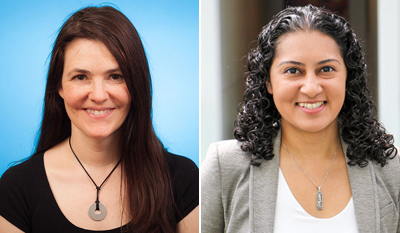Female surgeons in Ontario earn 24 per cent less per hour while operating compared to male surgeons: study

By Jennifer Stranges

Drs. Nancy Baxter (left) and Fahima Dossa
A new study led by St. Michael’s Hospital has found that female surgeons in Ontario earn 24 per cent less per hour while operating compared to male surgeons and that female surgeons performed fewer of the highest-paid primary procedures than male surgeons.
The study, publishing on Oct. 2 in JAMA Surgery, found no differences in time taken by male and female surgeons to perform common procedures. It also found that female surgeons are driven towards the less remunerative specialties and perform the less remunerative procedures within those specialties.
The findings challenge the common belief that a fee-for-service payment system – in which physicians are theoretically paid based on how hard and how long they work – closes the earnings gap between men and women.
Previous studies have demonstrated a pay gap in medicine and have attributed this in part to differences in practice styles between male and female physicians, and one proposed solution has been a fee-for-service system. However the study, which examined data from Ontario where most surgeons are paid through fee-for-service, showed that a significant pay gap persists even when men and women work equal hours. It also showed that female surgeons have fewer opportunities to perform certain types of operations.
“Our findings show the drivers of financial and remuneration differences for men and women in surgery and dispels the myth that women don’t earn as much because they don’t work as hard,” said Dr. Nancy Baxter, author of the study and a scientist with the Li Ka Shing Knowledge Institute of St. Michael’s. Dr. Baxter is also an adjunct scientist with the not-for-profit research institute ICES, where the Canadian data were made available through the ICES Data Repository — a province-wide archive that integrates multiple clinical and administrative health databases.
The study identified over 1.5 million surgical procedures claimed by 3,275 surgeons in Ontario from the beginning of 2014 until the end of 2016.
The researchers also found that male surgeons earned more per hour than female surgeons in almost all surgical specialties including gynecology, even though female surgeons were more highly represented in that specialty.
“Female surgeons are working in a system that wasn’t designed to support them. None of the disparities are due to choices — women are not choosing to make less — and we hope that the findings highlight the need for a solution,” said Dr. Fahima Dossa, co-lead author and general surgery resident at St. Michael’s.
The researchers are calling for all specialties to be paid adequately for work performed — especially as the number of female physicians approaches that of male physicians.
This paper is an example of how St. Michael’s Hospital is making Ontario Healthier, Wealthier, Smarter.
About St. Michael’s Hospital
St. Michael’s Hospital provides compassionate care to all who enter its doors. The hospital also provides outstanding medical education to future health care professionals in more than 27 academic disciplines. Critical care and trauma, heart disease, neurosurgery, diabetes, cancer care, care of the homeless and global health are among the Hospital’s recognized areas of expertise. Through the Keenan Research Centre and the Li Ka Shing International Healthcare Education Centre, which make up the Li Ka Shing Knowledge Institute, research and education at St. Michael’s Hospital are recognized and make an impact around the world. Founded in 1892, the hospital is fully affiliated with the University of Toronto.
About Unity Health Toronto
Unity Health Toronto, comprised of Providence Healthcare, St. Joseph’s Health Centre and St. Michael’s Hospital, works to advance the health of everyone in our urban communities and beyond. Our health network serves patients, residents and clients across the full spectrum of care, spanning primary care, secondary community care, tertiary and quaternary care services to post-acute through rehabilitation, palliative care and long-term care, while investing in world-class research and education. For more information, visit www.unityhealth.to.
